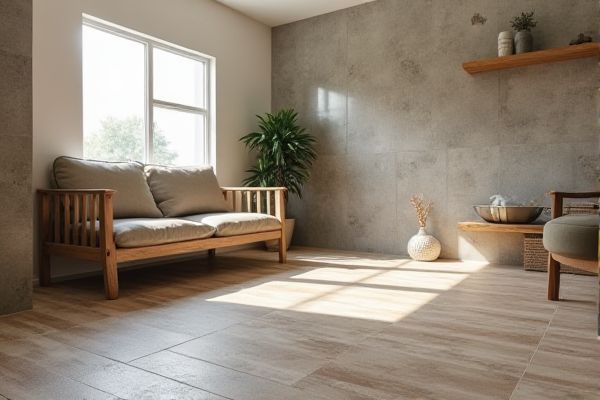
Interlocking tiles provide easy installation and durability, making them ideal for basements prone to moisture and temperature fluctuations, while rolled vinyl flooring offers seamless coverage and moisture resistance for a smooth, uniform look. Explore the full comparison to determine which flooring solution best suits Your basement needs.
Table of Comparison
| Feature | Interlocking Tiles | Rolled Vinyl Flooring |
|---|---|---|
| Installation | Easy DIY, snaps together without adhesive | Requires adhesive or heat welding, professional installation recommended |
| Durability | High impact resistance, scratches resistant | Good wear resistance but can dent or tear |
| Water Resistance | Waterproof, ideal for moisture-prone basements | Water-resistant but seams can leak if not properly sealed |
| Comfort | Firm surface with some cushioning options | Softer underfoot, flexible surface |
| Aesthetic Options | Variety of colors and patterns, modular design | Wide range of colors and designs, seamless appearance |
| Maintenance | Easy to clean and replace damaged tiles individually | Easy to clean but damage requires larger repair |
| Cost | Moderate initial cost, cost-effective installation | Lower material cost but higher installation cost |
| Lifespan | 10-20 years with proper care | 15-25 years with proper maintenance |
| Basement Suitability | Excellent for uneven or damp surfaces | Best for clean, dry, and level floors |
Introduction to Basement Flooring Options
Interlocking tiles and rolled vinyl flooring are popular basement flooring options offering durability and moisture resistance. Interlocking tiles provide easy installation and customizable design, while rolled vinyl excels in seamless coverage and affordability. Choosing the right solution depends on your basement's condition and aesthetic preferences to ensure longevity and comfort.
Overview of Interlocking Tiles
Interlocking tiles offer a durable and customizable flooring solution for basements, featuring easy installation through a puzzle-like connection system that eliminates the need for adhesives. Made from materials such as rubber, foam, or vinyl, these tiles provide excellent moisture resistance and cushioning, making them ideal for areas prone to dampness and fluctuating temperatures. Their modular design allows for easy replacement of damaged sections, enhancing long-term maintenance and cost-effectiveness compared to rolled vinyl flooring.
Overview of Rolled Vinyl Flooring
Rolled vinyl flooring offers a continuous, seamless surface ideal for basement areas prone to moisture and temperature fluctuations, enhancing durability and ease of maintenance. Compared to interlocking tiles, rolled vinyl provides superior resistance to water infiltration and is available in a wide range of styles and thicknesses to match basement conditions and aesthetics. You will find rolled vinyl flooring more cost-effective for large spaces due to its straightforward installation and fewer seams that reduce potential weak points.
Installation Process Comparison
Interlocking tiles offer a straightforward installation process with snap-together edges that require no adhesive, making them ideal for DIY basement flooring projects. Rolled vinyl flooring demands a more complex installation, often involving adhesive applications and precise cutting to fit basement dimensions and obstacles. Interlocking tiles also allow for easier replacement and repair compared to the permanent nature of rolled vinyl flooring.
Durability and Longevity
Interlocking tiles offer superior durability for basement floors due to their robust material composition, resistance to cracking, and easy replacement of damaged sections, ensuring long-term performance. Rolled vinyl flooring, while also water-resistant and cost-effective, tends to wear down faster under heavy traffic and can be prone to tears or punctures, reducing its lifespan in high-use areas. Choosing interlocking tiles enhances your basement's longevity with a more resilient surface designed to withstand wear and moisture over many years.
Water and Moisture Resistance
Interlocking tiles offer superior water and moisture resistance compared to rolled vinyl flooring in basement environments, as their click-lock design prevents water seepage between tiles. Rolled vinyl flooring, while waterproof on the surface, can trap moisture underneath if not properly sealed, leading to potential mold and mildew issues. Your choice should prioritize interlocking tiles for basements prone to humidity, ensuring a more durable and moisture-resistant flooring solution.
Comfort and Insulation
Interlocking tiles offer superior comfort and insulation for basements due to their thicker, cushioned structure that effectively reduces coldness and dampness from concrete floors. Rolled vinyl flooring, while durable and water-resistant, tends to be thinner and less insulating, often requiring additional underlayment to enhance warmth and comfort. Choosing interlocking tiles can significantly improve your basement's thermal insulation and provide a softer, more comfortable surface underfoot.
Maintenance and Cleaning Requirements
Interlocking tiles require regular sweeping and occasional mopping with mild detergent to prevent dirt buildup and maintain grout integrity, while rolled vinyl flooring demands less frequent cleaning, typically needing just a damp mop and neutral cleaner to keep its surface free of stains and scratches. Interlocking tiles are more resistant to individual section damage, allowing for easy replacement of damaged tiles, whereas rolled vinyl flooring may need complete patching or replacement if compromised. Both flooring options benefit from prompt spill cleanup, but rolled vinyl is generally less prone to mold and moisture issues due to its seamless installation.
Cost Comparison
Interlocking tiles generally have a higher upfront cost compared to rolled vinyl flooring, but they offer easier installation and better durability in basement settings. Rolled vinyl flooring is more budget-friendly initially, especially for large areas, but may require replacement sooner due to potential damage or moisture issues. Evaluating your basement's moisture levels and long-term maintenance costs helps determine the most cost-effective choice for your project.
Final Recommendation: Which Flooring is Best for Your Basement?
Interlocking tiles offer superior durability and easy installation, making them ideal for basement environments prone to moisture and temperature fluctuations. Rolled vinyl flooring provides a seamless, water-resistant surface with enhanced flexibility, perfect for basements requiring a sleek, low-maintenance finish. For long-term resilience and DIY-friendly installation, interlocking tiles are best; however, for a cost-effective, moisture-resistant solution with smooth aesthetics, rolled vinyl is the ideal choice.
 homyna.com
homyna.com